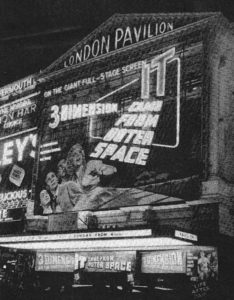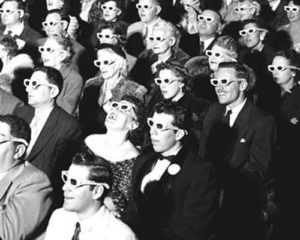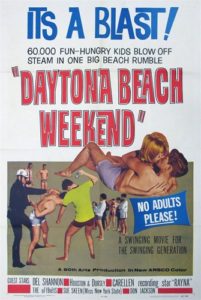
Ah, sweet summers of the 60’s. What could be more carefree than hanging out with Frankie, Annette, Fabian, Tab, and the rest of the gang on a sunny southern California beach with great rock and roll blasting in the background and, of course, a plethora of bikinis and muscular, bare-chested surfers…
Lord knows that there was enough pain, stress, and unrest in the decade to make your head spin. But beach movies provided us with an escape to a world where the biggest problem you might face would be trying to get the cute blonde with the groovy dance moves to notice you.
The beach movie era began with 1959’s Gidget. Sandra Dee’s character, Frances, learns to surf under the tutelage of one Moondoggie, played by James Darren. He is a dreamboat, and Gidget has her challenges ahead of her to get him to notice her as something other than a prodigy on a surfboard. Cliff Robertson plays the Big Kahuna, and Tom Laughlin, who would gain future fame as Billy Jack, had a bit part as well.
The movie was a smash, and another film involving lots of nubile young bodies clad in skimpy swim attire was released the following year.
In 1960, the phenomenon of the Fort Lauderdale college spring break was explored with Where the Boys Are, starring the lovely, sweet-voiced Connie Francis and George Hamilton. It too cleaned up at the box office.
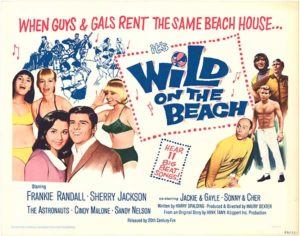
These two films, while serving as the harbingers of the beach movie phenomenon, achieved critical acclaim as well. That was not to be the case with the flood of beach party movies that would follow. But still, it was all lightweight fun to take our minds off of things like assassinations, war, and crosses in flames. In that sense, the movies scored a perfect ten.
Beginning in 1963, the movies that came pouring out of Hollywood included Beach Party, Bikini Beach, Muscle Beach Party, Ride the Wild Surf, Beach Blanket Bingo, The Girls on the Beach, How to Stuff a Wild Bikini, Endless Summer, The Ghost in the Invisible Bikini (which featured aging horror stars Boris Karloff and Basil Rathbone), It’s a Bikini World, and 1968’s The Sweet Ride, the last of an era.
The films had nice lightweight plots involving surf competitions, girls who just can’t get noticed by the cute guys, bikinis, extremely square dim-witted authority figures, bikinis, space aliens, hot rods, bikinis, dance contests, ghosts, and, of course, bikinis.
Top-forty hits were heard blasting in the background, and there would frequently be appearances by bands, whether put together just for the film, or established groups in their own right. These included Dick Dale and the Del-Tones, the Animals, the Castaways, the Pyramids, the Toys, the Beau Brummels, and the Kingsmen. Little Stevie Wonder was also a frequent musical guest. And the stars usually crooned a song or two apiece as well.
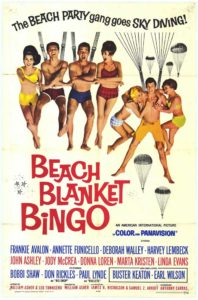
The movies had an astonishing variety of familiar names in them. Besides Frankie, Annette, Fabian, and Tab, these included Linda Evans, Deborah Walley, Jody McCrea, Tommy Kirk, Nancy Sinatra, Toni Basil, Shelley Fabares, Jackie DeShannon, Morey Amsterdam, Beau Bridges, Ronnie Howard, and Bobby “Boris” Pickett, who would score a Top Forty hit with Monster Mash. Token squares were played by Don Rickles, Buddy Hackett, Mickey Rooney, Elsa Lanchester, and Buster Keaton, among others.
Peter Lupus, who would go on to fame in Mission: Impossible, used his sculpted Mr.Hercules body to great effect in Muscle Beach Party, which also featured pre-steroid-era bodybuilders Dan Haggerty (aka Grizzly Adams), Chet Yorton, and Larry Scott.
The beach movie era was basically over by the Summer of Love. No comeback ever took place, which is just as well. The innocent free-for-all spirit of the lightweight classics could never happen in the 21st century. The sex that was so barely and carefully alluded to would now be depicted in its full unimaginative glory. The male lead would be coming to terms with his feelings of repressed homosexuality. The female would be dealing with having been raised in an abusive household. The bodybuilders would be suffering the effects of long-term steroid abuse. And the RIAA would sue anyone who dared to download any of the hit songs.
So here’s to the era of the beach party movie: a time of innocence that was seen in the movie theater that now seems as strange to us as the concept of filling up a car for five bucks.
